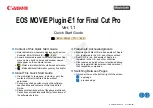
Design
SECTION 20 Best Practices
263
SECTION 20
Best Practices
This chapter details the best practices to get the most from CX-Supervisor
including how to plan and design your application.
20-1
Design
This section covers some good design practices. There is no doubt, as with
everything in life that a good design is essential and creating a good CX-
Supervisor application is no different. Poorly designed applications may run
slower, provide slower user feedback, be difficult to maintain - increasing costs
and in some cases not fulfil all User Requirements resulting in the application
being rewritten. Never fall into the trap "code first, think later".
20-1-1 Design your page layouts and navigation flow
Traditional design works well for most applications. Providing an application
with a clear structure can make applications very easy to navigate even if they
have many pages.
•
Create a Main overview / navigation page. This can include basic
information like company logo and date/time. If the application will be
using security levels provide buttons to login.
•
Add links from the main page to detailed system areas with either buttons
or schematic diagram e.g. Process 1, Process 2.
•
Add links from the main page, if required, to pages dedicated to Alarms,
Diagnostics, Reports, Data Logging, Statistics etc
•
If the system has repeated functions e.g. 5 similar machines, instead of
creating 5 pages think about creating 1 page that can show data for any
machine. This can be achieved using indirection and/or keeping data in
arrays, and just setting the index to display the machine you require. Minor
differences (e.g. a button for Process 1 only) can be shown or hidden
depending on the index. This will speed up development and also help
when the application is maintained.
Organise the pages sensibly on screen. Make sure that only the pages that
are necessary are open. When a page is no longer needed close it. CX-
Supervisor will update all pages that are open, therefore if lots of pages are
open then it may be doing a lot of unnecessary work that will slow down the
application. For pages that are displayed in the same place, set the 'Display
Mode' property to 'Replace'. This allows pages to automatically be closed
when a new page is loaded.
20-1-2 Use Logical Point names instead of physical addresses
Logical point names (like 'Boiler_3_Pressure') provide more flexibility than
physical addresses (like 'D8319') allowing the PLC program and addresses to
be changed, without impacting the SCADA. They also make it much easier
read during development, and more importantly, during maintenance.
•
Perform all data conversion in PLC ladder
Although today's PCs have excellent maths performance consider the
format of the PLC data and how it will be used. It can be temping to scale
a point value when read e.g. to change the units of measurement, or
Note:
If the Logical symbols are created in CX-Programmer, it can link them to a CX-
Server file which CX-Supervisor can then 'Import' into the Points Editor. This is
a very quick method of creating all the required points.
Summary of Contents for CX-Supervisor
Page 1: ...CX Supervisor Software Cat No W10E EN 01 User Manual Software Release 3 1...
Page 3: ...Copyright Notice 2...
Page 16: ...15...
Page 17: ...16...
Page 27: ...Tip of the Day SECTION 1 Graphics Editor 26...
Page 35: ...CX Supervisor Preferences SECTION 2 Pages 34...
Page 79: ...Responding to Events SECTION 5 ActiveX Objects 78...
Page 115: ...Printing the Graphics Library SECTION 7 Graphics Library 114...
Page 181: ...Data Logging SECTION 11 Data Logging 180...
Page 201: ...Examples SECTION 12 Databases 200...
Page 243: ...Performance Monitor SECTION 16 Application Analysis Performance Monitor 242...
Page 253: ...Using with Omron s CX Server OPC SECTION 17 Using CX Supervisor as an OPC Cli 252...
Page 259: ...Creating a CX Supervisor Client application SECTION 18 Connecting to a remote CX 258...
Page 263: ...Adding a Point Linked to a Parameter SECTION 19 Connecting to Omron Industrial 262...
Page 271: ...Data Logging SECTION 20 Best Practices 270...
Page 275: ...Configuring a Server PC running Windows NT or 2000 Appendix A Configuring a PC 274...
Page 277: ...Appendix B Frequently Asked Questions 276...
Page 296: ...Appendix B Frequently Asked Questions 295...
Page 297: ...Appendix B Frequently Asked Questions 296...
Page 298: ...Appendix B Frequently Asked Questions 297...
Page 299: ...Appendix B Frequently Asked Questions 298...
Page 333: ...Revision history 332...
















































